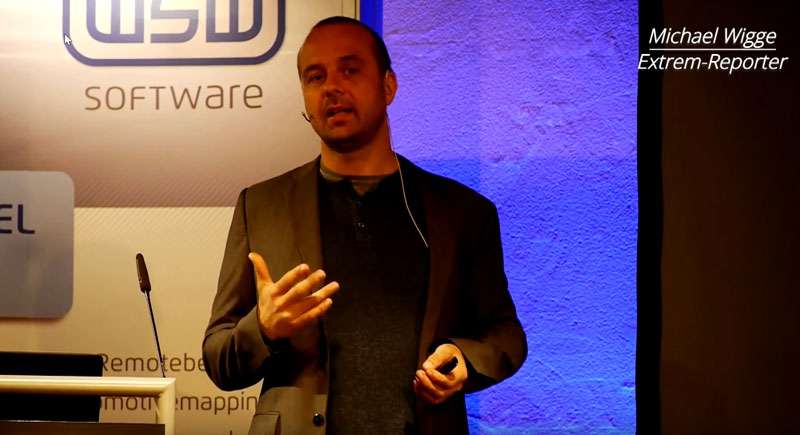Training Courses – Change Management
Leave Your Comfort Zone with Michael Wigge in 2026
Our Change Management training courses offer a unique and powerful approach to navigating organizational transformation, driven by the expertise of Michael Wigge, renowned motivational speaker and change expert. As the creator of the groundbreaking “How to Travel the World for Free” (PBS, NBC Tonight Show guest) project, Michael has firsthand experience in embracing change, overcoming obstacles, and leveraging resilience to turn challenges into opportunities. His journey has shaped him into an expert in understanding the human side of change and how to help individuals and teams thrive in constantly evolving environments.
Our Challenger Mindset program is customized to empower employees and leaders to shift their perspectives, overcome limiting beliefs, and embrace change with confidence. The program equips participants with practical tools and strategies to handle change, reduce stress, build resilience, and foster innovation. Through a mix of proven models like the SCARF and Three Zones models, participants learn how to manage emotional transitions, improve time and self-management, and develop a growth-oriented mindset that drives success in times of uncertainty.
Whether onsite or online, our courses offer flexible, interactive learning experiences that enable individuals and teams to unlock their full potential and effectively navigate organizational change. With Michael’s expertise, the Challenger Mindset program transforms change into a powerful catalyst for growth and success.
Table of Content:
Our Change Management Training Courses:
- Challenge-4-Change strategies for facing fears and resistance
- In-house training and individual pricing
- Stress reduction for employees in change processes
- 7-steps of the emotional change curve model
- Strength strategies for successful change management
- Mindset 4.0 to leave the comfort zone with self-awareness
- Becoming your best self-manager in times of change
- A practical reference for leaving the comfort zone and the tools to do so
- Adventure keynote by Michael on the topic of ‘Challenge and Change‘
- Pre-training communication on goal setting with the trainer
- MS Teams Implementation of the online seminar
Change Management Training Courses – Our 3 Aspects
1. The Challenger Mindset as Transformative Course
Our Challenger Mindset change management training courses are a transformative course designed to help participants step out of their comfort zones, overcome obstacles, and face their limiting beliefs head-on. Led by Michael, our change expert and motivational speaker, the course is rooted in his own experiences, including his groundbreaking “How to Travel the World for Free” project. Michael’s journey demonstrates how embracing change, resilience, and a challenger mindset can unlock new opportunities, and this philosophy is central to the training.
The change management training courses encourage participants to confront their fears and explore the negative beliefs that hold them back from achieving their full potential. Through a series of dynamic exercises and real-world strategies, attendees learn how to turn setbacks into stepping stones and view challenges as opportunities for growth. The training pushes individuals to break free from their comfort zones, build mental toughness, and develop the resilience needed to thrive during change.
2. Key Elements of the Change Management Training Course
3. Leave Your Comfort Zone
The change management training courses are practical and solution-oriented approaches to mastering challenges and achieving individual change goals. We can help employees learn to go beyond their comfort zone and overcome the fear of obstacles. Michael provides training support, inspiration, and a strategic approach to help them identify and work towards change management and development goals.
All participants define their goals during the training, which they try to implement after the workshop, actively going through a change process.
Michael is available as a trainer via email after the change training to communicate with you about hurdles and results.



Change Management Training Courses – 7 Keys
1. The Benefits of Our Change Management Training Courses
Our change management workshops provide numerous benefits to individuals and organizations, including:
- Adaptability: Our training equips participants with the necessary skills and mindset to embrace and navigate change effectively. It enables individuals to respond positively to new opportunities and challenges.
- Enhanced Productivity: By developing a resilient and adaptable workforce, change training boosts productivity and efficiency within organizations. Participants learn how to manage their time effectively and prioritize tasks amidst changing circumstances.
- Improved Communication: Change often requires effective communication to ensure successful implementation. Change training emphasizes the importance of clear and open communication, enabling participants to convey ideas, concerns, and expectations during times of change.
2. Methods of Change Management
Change management refers to the structured approach used to facilitate organizational and individual transitions. Some common methods and tools employed in change management include:
- Communication Strategies: Our training emphasizes the importance of transparent and consistent communication to manage resistance and build support for change initiatives. Effective communication channels, such as town hall meetings, newsletters, and regular updates, foster a sense of inclusiveness and understanding.
- Stakeholder Engagement: Engaging key stakeholders is crucial for successful change implementation. The training provides techniques to identify and involve individuals who will be affected by the change, ensuring their concerns and perspectives are considered.
- Training and Education: Our training equips individuals with the necessary skills and knowledge to adapt to new processes, technologies, or ways of working. It includes workshops, seminars, and on-the-job training to bridge any skill gaps.
3. Change Management Training Courses to Embrace Change
Participants in our change management training courses learn how to better embrace change by developing a growth mindset and building resilience. They understand that change presents opportunities for learning, innovation, and personal development. Here are some strategies that participants can adopt:
- Embrace a Growth Mindset: Participants are encouraged to adopt a growth mindset, which involves seeing challenges as opportunities for growth rather than as obstacles. This mindset shift enables individuals to approach change with curiosity, enthusiasm, and a willingness to learn.
- Practice Continuous Learning: Our training promotes continuous learning as a means of staying adaptable and relevant. Participants are encouraged to seek out new knowledge, attend training programs, and engage in self-reflection to enhance their skills and capabilities.
- Leave the Comfort Zone: The three-zone model of comfort zone, learning zone, and panic zone is emphasized in a training. Participants are encouraged to step outside their comfort zones and venture into the learning zone, where growth and development occur. By gradually expanding their comfort zones, participants can build resilience and embrace change more effectively.
4. Breakout Sessions and Single Exercises
Breakout sessions and single exercises play a vital role in our change management training courses, allowing participants to engage in interactive and practical learning experiences. These sessions provide opportunities to practice and reinforce key concepts. Examples of breakout sessions and exercises include:
- Group Discussions: Participants can engage in structured group discussions to share experiences, insights, and strategies related to change. These discussions facilitate peer learning and the exchange of best practices.
- Role-Playing Scenarios: Role-playing exercises enable participants to simulate real-life change scenarios and practice effective communication, problem-solving, and decision-making skills.
- Case Studies: Analyzing case studies related to successful change initiatives provides participants with valuable insights into change management strategies and their practical applications.
5. Adventure Keynote on Change by Michael
Michael’s adventure keynote on change adds an exciting and unique element to our training. Drawing from his personal experiences, Wigge shares stories of his adventures and demonstrates how he embraced change to achieve extraordinary feats. His keynote highlights the following aspects:
- Mindset Transformation: Michael teaches participants a completely new mindset towards change. By challenging their preconceived notions and limiting beliefs, he inspires individuals to adopt a positive and open attitude towards change.
- Facing Fears: Through his adventures, Michael shows participants how to face their fears and overcome obstacles. He emphasizes the importance of using the power of the mind to conquer self-imposed limitations.
- Scaling Fears: Michael encourages participants to push their boundaries and constantly leave their comfort zones. He demonstrates practical techniques to overcome fear and embrace change through his mantra of “Mind over Mood.”
6. Resilience, Stress, Time Management, and Motivation
To effectively navigate change, participants in our workshops receive resilience, stress management, time management, and motivation training. These components equip individuals with the necessary tools and techniques to cope with challenges and maintain high performance. Some specific tools and exercises include:
- Resilience Building: Participants learn techniques such as mindfulness, positive self-talk, and goal setting to enhance their resilience in the face of change. They also explore strategies to manage stress and maintain work-life balance.
- Time Management: Participants are introduced to time management tools and frameworks, such as the Eisenhower Matrix and Pomodoro Technique, to prioritize tasks, manage deadlines, and improve productivity.
- Motivation Enhancement: Change training incorporates motivation-building exercises, such as visualization, goal setting, and creating action plans. These exercises help participants stay motivated and focused on their personal and professional goals.
7. Setting A Personal Project/Challenge
Out seminars empowers participants to set up their own projects or challenges during the training program. This practical approach enables individuals to apply the knowledge and skills they have acquired, allowing them to practically work on challenging themselves and practicing change in a controlled environment. Participants receive guidance and support from trainers and peers throughout the process, fostering continuous learning and growth.
8. Change Management Training Courses Resources Part 1
- Prosci
Prosci is a globally recognized change management training course provider. They offer a range of programs and certifications, including the Prosci Change Management Certification. Their approach is research-based and focuses on the ADKAR model (Awareness, Desire, Knowledge, Ability, Reinforcement) to effectively manage individual and organizational change. Prosci also provides a variety of tools, resources, and best practices to support successful change implementation.
- The Change Management Institute
The Change Management Institute offers comprehensive training and certifications. Their programs cater to professionals at all levels of experience, from beginners to seasoned practitioners. The Institute’s training focuses on building change management capabilities, providing frameworks, methodologies, and practical tools to effectively manage change initiatives. They also offer a global community of change professionals for networking and knowledge sharing.
- Association of Change Management Professionals
The Association of Change Management Professionals (ACMP) provides training and certifications for professionals seeking to enhance their change management skills. Their training programs cover various aspects of change management, including leadership, communication, and stakeholder engagement. ACMP also offers access to a vast network of change management professionals, conferences, and resources to support continuous learning and professional development.
9. Change Management Training Courses Resources Part 2
4. Change Guides
Change Guides offers training and consulting services to organizations worldwide. Their training programs cover a wide range of change management topics, including change, leadership, communication, and stakeholder engagement. Change Guides’ training is interactive and engaging, incorporating case studies, exercises, and real-world examples to facilitate learning and skill development. They also provide consulting services to guide organizations through complex change initiatives.
These are just a few examples of reputable change management seminar providers, each with its own unique approach and offerings. When selecting a change management workshop provider, it’s important to consider the specific needs and goals of your organization, as well as the expertise and experience of the trainers. The right training provider will equip you and your team with the knowledge, skills, and tools necessary to effectively manage change and drive successful outcomes.


‘With the right strategy, you can achieve any goal’ – MICHAEL WIGGE
Further Training Links
FAQ – How Large are Your Workshop Group Sizes?
Our change management training courses usually have uo to 10 people. Clients can book larger group sizes if wanted.
FAQ – Do you Offer Change Management Training Courses Online?
We offer our change management training courses onsite and online. And we offer the seminars in English and in German.
Michael’s Motivational Tour in 2026
March 2026
Boulder, USA
May 2026
Flagstaff, USA
June 2026
Asheville, USA
September 2026
Freiburg im Breisgau, Germany
October 2026
Innsbruck, Austria





